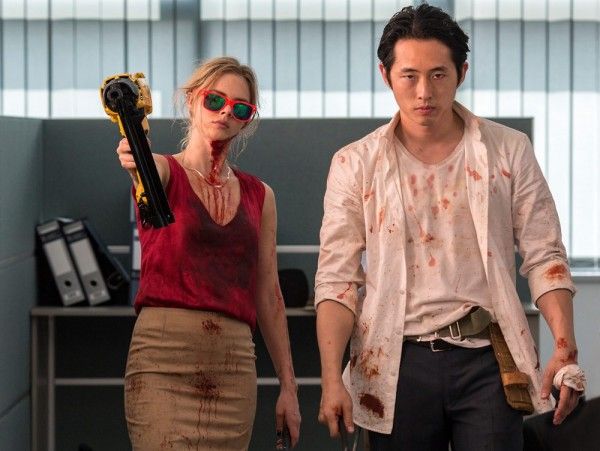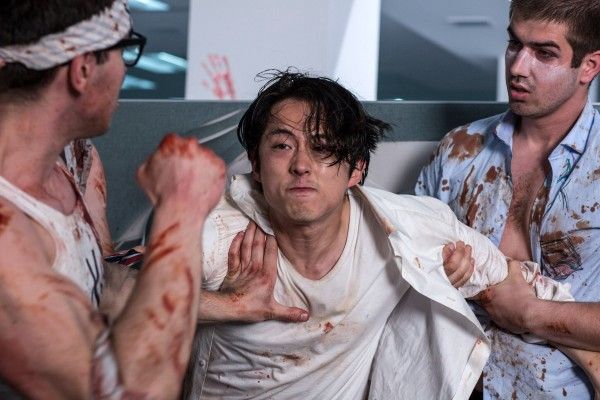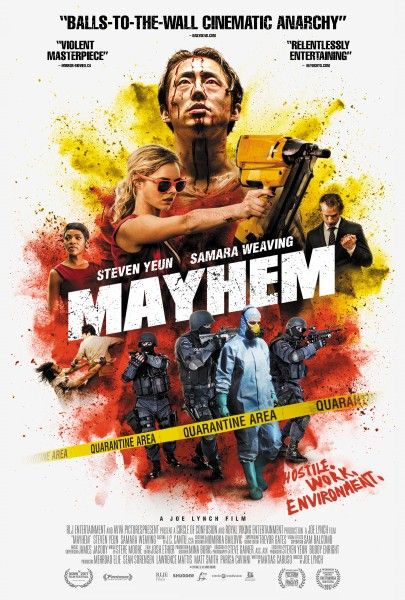In Mayhem, Steven Yeun gets bloody and brutal as Derek Cho, a corporate climber having the worst day of his career when he discovers that the law firm’s building is under quarantine for a dangerous virus that drives the infected to act out their wildest impulses. With chaos unleashed in the office, Derek teams with a former client (Samara Weaving) to claw their way up the corporate food chain and get their justice.
With Mayhem now available on VOD and in select theaters, I recently hopped on the phone with Yeun to talk about the film and why he wanted to play a character like Derek, warts and all. We discussed how a desire to channel anger and rage against the machine drew him to the film, how they kept the cynical film from becoming mean-spirited, the lies we tell ourselves to fit in, trusting his gut to pick his post-Walking Dead roles, and why we should all just like what we like, even if it's Dave Matthews Band. Check out the interview below.
First off, congrats I really dig this movie. For you, this is obviously a really cool sort of unconventional hero role, a bit bloodier and darker, but essentially a fun action antihero part, but the film also has some fascinating commentary on the corporate culture that's a huge factor in American culture right now. What was the element for you that made Mayhem feel like something you had to do?
STEVEN YEUN: I think those themes of rage against the machine and fight against the man, those are obviously classic themes and those are something that I feel like never lose their welcome. Personally for me, I’m all about that theme, but at the same time I was attracted to it because it said it in a different way, just by virtue of, to be quite honest, having a nontraditional lead. I think that’s a really good time for me, personally, but I didn’t want to make Dereck into some awesome person. He still did some shitty things and he’s still a scumbag in some regards and that’s because he’s made a lot of concessions in order for him to survive, or that’s how he justifies it. I wanted to show warts and all, and i think that was the draw for me. We could definitely go with the angle of just making this guy look good, and like a hero, and like he’s doing the right thing, but just like most people, they’re just as shitty as they are good. And to be quite honest, I wanted to explore ager a lot. I don’t know what it was that year, I was just angry — not at anything, but just maybe universal anger that was going around and I wanted to exercise that in a really ridiculous, fun way.
I spoke with Joe recently about that sort of fun tone and he mentioned that it was important to you that no matter how cynical the film gets, that it wasn't just mean-spirited. How did you guys navigate that balance on set and in your performance?
YEUN: I think the mean-spirited part. I know classically films maybe that get put out that look like this, that people are used to seeing, people don’t really think twice to go a couple layers deeper — I honestly think that if someone enjoys this films it’s probably because they’re tapping in to the fact that we actually really tried to justify why anyone would do whatever they’re doing. Obviously, we could always hide under the guise of “Oh, the virus made me do it,” but really it’s just picking up on your rage, so what are the things that made you get to that place? How many things have you lied to yourself about so that you just follow along with the system? If that’s the case, then you’ve got so much pent-up rage that you don’t even know is in there. For us, all we could try to do was tell the truth in a very not truthful situation. I think that was our barometer of balance. When we were cynical, it’s like, call that shit out and when we’re having a cathartic moment, go for it. Go as balls to the walls as you can.
Even the conversation that we provided about the Dave Matthews Band, you know that’s a real thing. I think so many people love to shit on Dave Matthews Band because it’s cool to do so, and people that actually like them are scared to admit they like them. So society overruns their individual ideas or agendas or personal thoughts. Personally, for me — yeah, he’s great, he’s fine, he’s super talented and so that’s kind of when you get to this place of, how many things are you just following along? I think those are those little tiny details we added to the film to be like, hey, let’s not make this your cookie cutter, standard beat up people [movie], because I don’t really want to be part of that nor do I want to see that. Personally, for me, what was really effective was just the fact that you have an Asian guy in the lead doing nefarious things but at the same time doing heroic things. We have people that you believe look like they’re good people and then at the next moment, the audience feels like they deserve to die. There’s just so much duality to everything we’re trying to say here — I’m not trying to say we made Picasso or something, but I’m just saying we’re trying, so hopefully, it conveys.
You mention being an Asian American lead in this sort of unconventional role, was that a draw for you outright?
YEUN: I don’t think that was any draw for me. Personally, at least for my barometer, that’s a trap. I think if I chose something based on the idea of it being a precedent, it’d probably be a bad time. I think it just felt honest. I read the script and I was like, “I’ve seen this movie before, what does it mean for me to be the lead?” All of me, not just the Asian part of me, but all of me. I saw that and I said that sounds like fun, that sounds like something people probably haven’t seen before, but beyond that, that sounds like a good time for me, so I just did it. [Laughs]
You had such a high profile departure from The Walking Dead considering the circumstances of Glenn's death, and you've used the spotlight that comes with that to do really interesting projects like Mayhem and Okja this year. How are you picking what you want to do now that you're not committed to a cultural juggernaut like that?
YEUN: I don’t think I really have an agenda or a strategy, if I have a strategy at all, I think it’s just to listen. Some of the things that have come across my desk, the gut says “that’s probably not something that you want to do.” And then other things will come across my desk and I’ll be like, “That sounds exactly like something that I want to do.” I haven’t really been thinking — not to say I haven’t been thinking, I overthink all the time, but I’ve been hopefully doing a better job of just listening to my gut and going with it. I think when you post limitations on yourself, you get bored.
You've been keeping busy in animation, especially over at Netflix. How did that line of work come along for you?
YEUN: I have no idea. I got a phone call one time and they’re like, “We’d like you to voice a character for us,” and after I did that, they kept asking. So I was like, "I like that, I’ll keep doing it." [Laughs]




